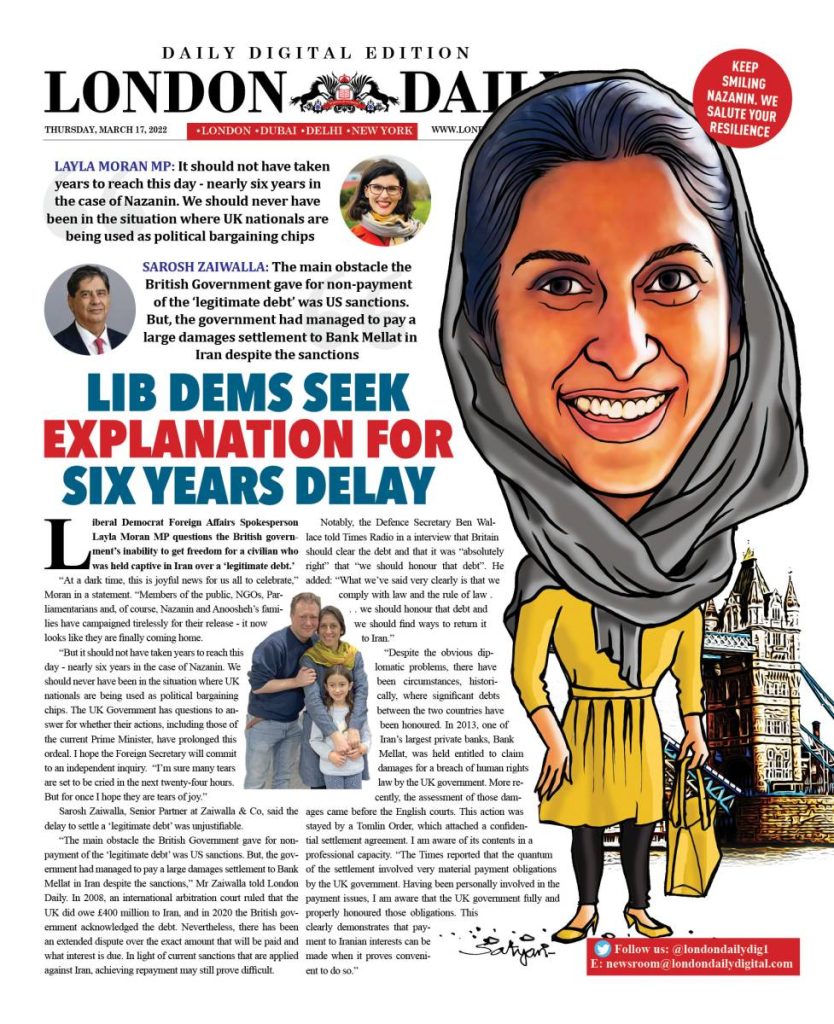
Nazanin Zaghari-Ratcliffe is back in Britain after six-year detention in Iran, she became a pawn in the hands of Iranian authorities to retrieve their £400 million debt from Britain. Foreign Secretary Liz Truss confirmed the payment to Iran to settle a ‘legitimate debt’ on the same day Nazanin was released from Iran. The foreign secretary blamed US sanctions on Iran for the delay. Is that true?
Nazanin blamed five foreign secretaries to take a decision on a dispute which cost her freedom for six years. She was forced to stay away from her daughter Gabriella and her husband. Who is to be blamed for this fiasco? London Daily’s Azeez Anasudhin meets Sarosh Zaiwalla, senior partner at Zaiwalla, to find some answers. Excerpts:
What is your take on Nazanin Zaghari-Ratcliffe’s release from Iran after six years’ detention?
I wholeheartedly welcome Nazanin Zaghari-Ratcliffe’s release from her long detention in Iran as I am sure does everyone in the UK. In addition to her physical suffering, she must have suffered enormous emotional pain from being away from her husband and her daughter for a long period. I wish her and her family all the very best. This is a piece of very good news at a time that we all needed it.

News agencies are saying the UK paid £380 million to secure freedom for Nazanin. Did the Iranians use Nazanin as a bargaining chip to secure the old payment to procure Chieftain tanks from the UK?
These reports are numerous and consistent to be sure. Many reputed journalists appear to be convinced this was the case. However, without seeing the evidence behind the reports I cannot say for sure.
The fact is that the British government was under a legal obligation to return the advance payment made by Iran in the 1970s for the purchase and delivery of Chieftain tanks. There is no dispute that the UK did not deliver those tanks in the wake of the Iranian revolution in 1979, and at least since the result of an international arbitration award in 2002. There is no doubt about the UK’s liability to pay the money to Iran if the government wants to pay.
It took six years to secure the release of Nazanin. The delay took a great toll on her family. The blame lies squarely on the government. Are they responsible to pay compensation for Nazanin’s sufferings?
The toll on Nazanin and her family was great. However, it is difficult to argue that the blame lies squarely with the UK government. It is of course true that they did not pay money that was owed to Iran. The current reports also suggest that the government’s argument that it could not pay the money because of sanctions may be questionable. However, it is the Iranian government who imprisoned her and, if the reports are true, effectively held her hostage for ransom. There also remains the question that Nazanin was convicted by an Iranian court for a crime which in all probability she did not commit.
I would be wary of having to argue that Nazanin’s imprisonment was a natural and foreseeable consequence of the failure to pay the debt, which is normally required to be established if a compensation claim is to be made. Of course, ultimately I cannot say at this stage whether or not the UK government would be held liable to compensate the Zaghari-Ratcliffe family for their suffering. I would say it is very unlikely the government will admit any sort of liability, but that does not mean it cannot take steps, including by paying money, to ensure that the family are put in as secure a position as possible now that Nazanin is back.
Is there any international law to prevent similar detentions?
There is no settled law that governs this question because it is simply too big a question. At heart, this would relate to the question of when a state may arrest a holder of a foreign passport for offences allegedly committed in that state’s territory. In principle, any state has the ability to do justice in its own way where an offence is said to have been committed within its territory and the accused is also within that territory.
There is international law that is designed to blocks states from arresting, prosecuting and imprisoning people without due process or fair trials. However, the enforcement of that law against a sovereign country from the outside is challenging, even in the most flagrant circumstances.
That is in my view the main reason why situations like Nazanin’s need to be handled at an international diplomatic level rather than adopting a strictly legal approach.

Are you happy with the way Prime Minister Boris Johnson handled this issue?
The most important thing right now is that the UK government has, it seems, finally paid the debt owed to Iran, and clearly, Nazanin has been released. Given that previous governments going back to 1979 have refused to pay, I believe credit should certainly be given to Prime Minister Boris Johnson for finding a way to pay the debt due to Iran. As matters stand however I have not seen any evidence of a key change in circumstances which means that the money which is not going to be paid could not have been paid in 2016 when Nazanin was detained.
I understand that it may be said this was the equivalent of paying a ransom to a kidnapper, however, the facts are that the money was actually a legally payable debt, and the UK has now decided to pay it. As such it seems it may have been possible to spare Nazanin her whole ordeal.
The British government blamed US sanctions for delaying the settlement of the legitimate debt. What’s your take on this?
The UK’s excuse for non-payment was that US sanctions on Iran and in particular the suspension of banking services to Iran prevented the payment. However, from my experience, this does not hold water. The UK government did make payment of very a large amount of money to Iran in respect of agreed damages in the case of Bank Mellat of Iran, in which my firm Zaiwalla & Co had acted for Bank Mellat.

Bank Mellat’s claim was settled following the UK Supreme Court’s ruling that the UK Government had acted both irrationally and unlawfully by including Bank Mellat as a named target of sanctions to prevent nuclear proliferation. In light of that, the UK could well have paid in the same way the debt owed to Iran in respect of these undelivered tanks. I understand that the USA has settled similar sorts of debts owed to Iran by flying cash to Iran. The debt could also theoretically have been settled by providing commodities and even medicine.
Foreign Secretary Liz Truss is saying the debt refund will be used for humanitarian projects. Can we trust Iranians? If they are not committing to the promise, what will be the next course of action?
Until I have seen the terms of any agreement or undertaking by the Iranian government I cannot comment on whether it will be binding, nor whether it would be honoured. On the face of things, Iran was owed this debt and should be entitled to use the money however it wishes.
ALSO READ-London adds steel to stem terror attacks


